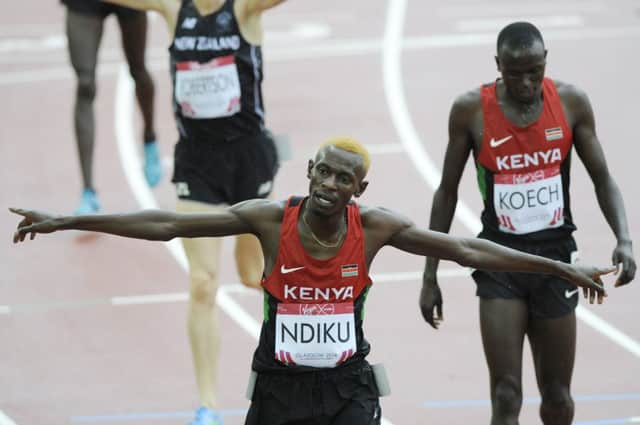Commonwealth Games: First track gold for Kenya


In the opening session of the athletics competition, the greatest applause was saved to the last, not for a Scot nor for a champion but for a 17-year-old from the Solomon Islands whose challenge had been extinguished by the end of his opening lap.
The advance script for the 5,000 metres final was supposed to see Mo Farah bestride the stage but instead it was Rosefelo Siosi’s under-performance which stole the show and captured hearts. Lapped three times, he ended an improbable three minutes and 43 seconds adrift of Kenya’s Caleb Ndiku who took the first track gold of these Games.
Advertisement
Hide AdAdvertisement
Hide AdYet it was Siosi whose presence was accompanied by a din of noise that suggests that those members of the track and field royalty who have passed on coming to Glasgow will not be missed. “It was just too cold out there, but the crowd gave me the courage not to quit,” said the unlikely hero. “I thought about quitting after the first two kilometres. I tried to chase them and they were just too fast for me, but I came here to finish. My head is in pain with all the noise – it was: ‘Raaah, raaah’. They were cheering for me. It encouraged me to keep going and finish – raaah, raaah’. It was good fun.”
That Ndiku sparkled, far ahead, almost passed unnoticed. His victory, in 13:12.07, will doubtless mark the start of the country’s dominance of the middle and long distances over the next seven days. His smile beamed down the home straight, the resistance of compatriot Isiah Koech broken as he was forced to settle for silver with New Zealand’s Zane Robertson taking a surprise bronze.
“I could see it wasn’t going to be easy,” said Ndiku, who added Commonwealth gold to the world indoor title he secured in March. “There was a lot of tough competition and I needed to know when to attack.”
Luke Caldwell had the honour of being the first Scot in finals action but there was no history to be made. The third Briton home after Andy Vernon and Tom Farrell, the Stateside-based prospect ended in 13th place. “I’d have liked to have come a few spots higher but I don’t know if I’ll ever get this again,” he said. “It’s mad. It’s certainly given me the taste for coming back and being at major championships. It’s fuelled the fire.”
It was the reception when he was announced to the audience which will live longer in his memory. For Scotland’s trio of hammer throwers, their own acclaim was both a blessing and a curse. “My legs turned to jelly,” declared Myra Perkins. “I can’t even explain how it feels,” added Rachel Hunter.
The younger of the three, Hunter – a student nurse from Ayrshire – was overwhelmed by emotions, her eyes flooded by tears even after she had joined her cohorts in qualifying for tonight’s final.
With Canada’s Sultana Frizell heading the standings with a Games record of 68.92 metres, McKelvie and Hunter progressed off their second throws while Perkins had to wait until the very last before surviving the cut in 12th.
“I wasn’t really happy,” said 20-year-old Hunter. “I know I can throw a lot further. Because my technique wasn’t really great. I’ll go to the village and chat with my coach before I leave for the final.”
Advertisement
Hide AdAdvertisement
Hide AdAll of England’s trio of sprinters moved into the semi-finals of the 100 metres with Adam Gemili the quickest in the heats with a run of 10.15 seconds. “I just wanted to qualify outright and the best way to do that is win your heat,” the Londoner said. “I tried executing the first half of the race and then ease it down in the second half and I believe I did that. I’m feeling in good shape so we’ll have to wait and see. It’s about execution, so if I do that right, I should be good.”
Trinidad’s Richard Thompson was unconvincing but won through as a fastest loser while Jamaica’s Nickel Ashmeade, the presumed favourite, remains in the hunt. With Usain Bolt saving himself for the relays, his island expects.
“Semi-final and finals are what matters,” Ashmeade said. “Opportunity is always there, doesn’t matter where you are. Usain has been very inspirational. He has done a lot for sport and the country and has set the standards so high that athletes coming up can hopefully work him harder.”
Former world champion Amantle Montsho of Botswana coasted into the semis of the 400 metres but there was a poignancy that Novlene Williams-Mills will be there also, not just making up the numbers but as a contender. Following the 2012 Olympics, where she helped Jamaica to relay bronze, she underwent a mastectomy to repel breast cancer. Rebounding to health, she now receives emails on a daily basis from those whose fight is not yet done.
“That medal, getting that, would tell everyone that to be a cancer survivor is something worth fighting for,” the 32-year-old said. “I have fun with my friends who always told me that I had to keep going, no matter what. But at the same time, I knew it was going to be hard. I’m still fighting.”
Today sees Laura Muir begin her bid for a 1500m medal with the 21-year-old eager to underline her emergence as a world-class performer on home soil. “It’s probably the only time I get to wear a Scottish vest in front of a home crowd in such a big level. It’s a first and a last for me. But I’m really looking forward to it.”
Scottish trio Allan Smith, David Smith and Ray Bobrownicki all go in the high jump qualifying while Chris Bennett, Andy Frost and Mark Dry begin their hammer challenge.